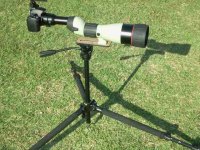Cheers for that - but does this mean that higher level Nikon bodies cant use AF lens?
Gentoo's repsonse
"yes it does"
is wrong.
Nikon D40/60's require the lens to have an autofocus motor so that means it'll only autofocus with Nikon AF-s lens, Sigma HSM lenses (plus any lens with OS I believe) and some Tokina and Tamron lenses (I know Tamron are introducing more such lenses).
None of Nikon's other camera's have this requirement and will autofocus with any lens made in the past 10 years. Providing it is an autofocus lens!
Ok upgrading. This gets a bit more complex. Nikon makes two types of dSLR (as does Canon and Sony). Nikon calls them DX (APS-C sized sensor) and FX (Full Frame).
If you were to upgrade a d60 (a dx camera) to a d300 (a dx camera) all your lenses would work. if you were to upgrade to a d700 (an fx camera) then only the lenses that were FX lenses would work.
The 18-55 lens with the d60 is designated a dx/aps-c lens.
The APS-C sensor is smaller than Full Frame and kit lenses for dx/aps-c won't cover the sensor. This problem is the same for Sony and Canon as they too have cameras based around sensors that are of different sizes.
Postcardcv is sort of right you can elect to buy full frame lenses only but there aren't many cheapish FF lenses worth buying for an entry level APS-c camera. IF you are interested in landscapes this is an issue.
Given you can't buy a Full frame camera for under £1300 you won't be doing that for a while.
The auto-focus issue is not a big deal for most people since most lenses Nikon currently sells have an auto-focus motor. The exceptions are wide angle primes which I'd not expect someone getting a d60 to want and annoyingly the 80-400.
As to the whole Nikon v Canon debate its a bit daft both make good cameras and lenses.
There are strengths and weaknesses in both lineups.
And if anyone is interested I'd say Nikon has more variety in cheapish kit lens with Nikon 18-105 vr, 18-70 etc and Canon has nothing to match the 14-24. whereas Canon has the edge with IS/VR in their 300f4 and USM/AF-S in there 100-400.
I'm a Nikon user but whichever brand you buy you won't go far wrong.
You could make a good case for Sony, Pentax and Olympus if you wanted to no doubt.
You could consider buying second hand. Grays of Westminster give you a one year guarantee or 2nd hand good and sell mailorder. I imagine someone can tell you an equally reputable dealer for Canon.
What is your budget by the way? Its rather easy to buy something and then repent.
Also what are you buying for? are you interested in mostly photographing wildlife or would people and landscapes come into it?




